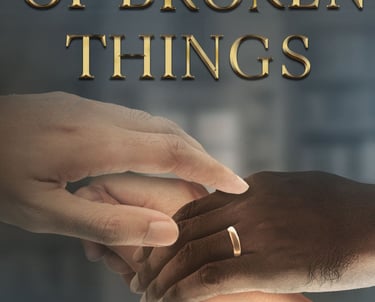The Care of Broken Things: On First Characters, Shame, and the Love That Stays
Before it was a book, it was a heartbeat.
7/12/20253 min read
Before it was a book, it was a heartbeat.
There's something sacred about the first characters you create—the ones who emerge not from borrowed worlds, but from the quiet, insistent hum of your own mind.
For me, those characters were Samuel and Nathaniel.
Before them, I wrote fanfiction, exploring other people's characters, tracing the edges of stories already imagined. But Samuel and Nathaniel were different.
They were mine.
Of course, they weren't who they are now. Not yet. Back then, Nathaniel was more like the current Samuel—wry, closed-off, gentle in the sharpest possible way. And Samuel was something different, a shifting shadow between Eli’s warmth and something darker. There was no prison, no trauma, no aching weight of survival. Just curiosity. Characters who felt like new skin, and for the first time, I felt what it was like to inhabit a world I'd built myself.
When Characters Arrive Whole
Then came Eli.
Some characters have to be carefully crafted, assembled piece by piece until they have enough components to come alive. But Eli wasn't constructed. He arrived. Fully formed. Kind. Steady. Gentle in the way the world desperately needs and rarely allows.
His smile, his faith, his softness—he never changed. Most characters bend as I write them. They evolve. Eli never did. At first, I worried he was too perfect. Too good to be real. Who would connect to someone like that? Certainly not me.
But I didn't pair him with Samuel, who matches him visually. I married him to Nathaniel—Nathaniel, who would forever have a complex about it. Who would wonder if he's enough. And somehow, that worked.
Because Nathaniel is the nexus. The quiet one. The stillness between storms. He's "boring," maybe, but he's also the one I find it easiest to breathe around. Everyone else connects through him. Even Eli and Samuel love each other through Nathaniel. He holds the space for love to exist.
If Nathaniel is the anchor, Samuel is the Wound.
I don't know if I've fully processed who Samuel is to me. Myself, perhaps. My son. The child who bleeds so much even his love is edged with pain. With him, I don't think it's possible to give too much, especially when so much of what you put into him leaks back out. I cannot give him anything but a happy ending—and I won't. He deserves to be loved, even if he'll never believe he's worthy of it.
Samuel wasn't always a survivor of CSA. That came later, when I was ready—finally—to look at my own history. To peel back the layers of shame that made it impossible to write, impossible to remember.
Shame may be the true theme of this book. Not pain. Not even love. Shame that we shouldn't carry, that was never ours to begin with. That buries us unless we claw our way out.
Love helps, of course. It always helps. But it doesn't cure. The real healing is work—brutal, slow, and often lonely.
Beautiful Messes
Here's what I've learned: broken things are the only ones who really exist. So "fixing" them doesn't work. If you try to erase the cracks or glue them together too tightly, you brush away all the sharpness that captured you in the first place.
I don't glamorize pain. I've lived enough of it to know that when pain is happening, it's flattening. Dulling. You cannot create when you're drowning. So whatever people might say about the darkness in my books—know this: I do not write suffering for spectacle. I write it because I've felt it, and I need a place to put it. Somewhere it might stop echoing inside me.
When Love Feels Like a Burden
Because when you're chronically ill, or traumatized, or exhausted beyond what words can say—love doesn't always feel like healing. Sometimes it feels like a burden. You look at the people who love you and wonder if they'd be happier without you.
But real love shouldn’t leave. It sharpens itself against your edges and stays anyway.
Often, broken people don't want to be cared for, tired of hurting those they hate to hurt most. But the best kind of love insists. It stays and accepts all the prickling, even when it forces change bigger than we want to make.
An Invitation to See
The Care of Broken Things is about that need. About trauma, survival, obsession, and the families we make out of what's left. It's a polyamorous MMM prison romance, yes—but it's also a story about the love that stays. The love that insists. Even when it hurts. Especially when it hurts.
So I don't ask you to love Samuel, Eli, or Nathaniel. Love is responsibility, and I don't take that lightly. I only ask that you see them. And maybe, in seeing them, see yourself.
We are all beautiful messes. All broken in some way. But broken things are still worthy of care—and I care about you.
If this book found you, I hope it was at a time when you needed it. And I hope it stays.
The Care of Broken Things is available now for pre-order. A devastating queer romance about the families we carve from our own ribs and the love that refuses to let us stay broken. For fans of Captive Prince, Wolfsong, and The Foxhole Court. If you've ever felt too broken to be loved—this is for you.
– October
The Care of Broken Things
Samuel has spent years building walls.
Not the prison’s concrete ones, but the kind that keep lives from bleeding into each other. As the prison’s self-appointed librarian, he’s carved out a fragile peace where silence is his shield. The inmates call him The Ice Queen—a title he wears like armor. After a lifetime of being preyed upon, he knows better than to let anyone close.
Then Eli arrives like sunlight through bulletproof glass.




